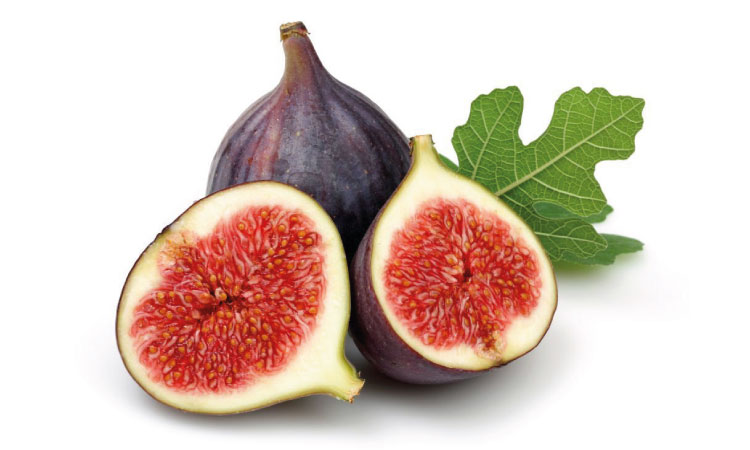During pregnancy, it is recommended that pregnant women consume a great deal of fresh and dried fruits. One of the first things that come to mind when thinking of dry fruits is figs. There are more antioxidants and phenolic compounds in dried figs than in fresh ones. Fresh figs are also high in nutrients, and they don’t contain a lot of calories, making them an excellent addition to a healthy diet. Figs are commonly referred to as ‘Anjeer‘ in Hindi. During pregnancy, a woman’s health is crucial and sensitive. It is vital to follow a healthy and safe diet. Anjeer during pregnancy can certainly satisfy sweet cravings and provide many important health benefits at the same time. Figs are a fat-free, cholesterol-free food. We’ll take a look at the safety of figs during pregnancy, their benefits and risks, along with how to incorporate them safely into pregnancy’s diet.
Is It Safe To Eat Figs During Pregnancy?
Figs have a distinct honey-like flavor. They are therefore popular among pregnant women. Figs are different from other fruits because of their flavor and medicinal properties. Not only is it safe during pregnancy, it is one of the fruits that pregnant women are highly recommended to consume and is considered as one of the pregnancy superfoods.
Eating figs during early pregnancy may alleviate morning sickness. It can also meet your body’s nutritional needs during this phase of pregnancy. Eating figs during pregnancy third trimester can be helpful in preventing constipation since they contain a high amount of fiber.
Moderate consumption of figs during pregnancy can definitely boost the intake of nutrients. Fig overconsumption, however, can lead to complications during pregnancy such as high blood sugar levels.
Nutritional Value Of Figs
Mineral content of figs is higher than other common fruits and vegetables. According to source, figs are loaded with minerals like calcium, magnesium, potassium, copper, and phosphorus. Besides vitamin A, D, E, K, and B complex, they also contain natural sugars, soluble fibers, organic acids, and fats.
Another source states that,
- Minerals in figs are similar to those in breast milk
- Dried figs are rich in iron. They contain about 50% more iron than beef liver
- Fatty acids found in figs include myristic acid, palmitic acid, stearic acid, oleic acid, linoleic acid, and linolenic acid
- Figs contain phenolic compounds, notably rutin
- Omega-3 fatty acids are abundant in dried figs
- Fibre content of figs is higher than that of any other fruit. Figs contain both insoluble and soluble fiber
Related Reading: 15 Fruits Not To Eat During Pregnancy
Benefits Of Eating Anjeer During Pregnancy

Anjeer has been widely used in many countries as a traditional medicine. It is used to treat and prevent several complications. Figs are especially rich in calcium, iron, potassium, and zinc, which are essential nutrients for pregnant women. It is known for its anti-cancer, anti-fungal, anti-viral, and anti-bacterial activities1 and, thus is one of the simplest ways to boosts immunity during pregnancy.
Calculate Due Date With LMP
Here are the benefits of eating Anjeer during pregnancy:
1. Figs helps to alleviate morning sickness
Figs are an excellent source of B6. Vitamin B6 has been found to reduce morning sickness. When you wake up in the middle of the night, eat a few dried figs. You’ll feel better the next day. Figs can also be eaten as healthy midnight snacks, of course in limited quantities2. Figs contain high levels of vitamin B6, which elevates serotonin levels, which are responsible for mood enhancement. So, eating figs during pregnancy may help to reduce mood swings3.
Related Reading: 15 Tried And Tested Ways To Handle Emotions During Pregnancy
2. May help in brain development of the fetus
Consuming figs during pregnancy contributes significantly to the development of the fetal brain. Figs are packed with omega-3 fatty acids and folate, which are vital for fetal brain development. Preterm births and premature deliveries are also reduced when pregnant women consume adequate omega-34.
3. Helps to reduce the risk of pregnancy hypertension
Consuming low amounts of potassium-rich foods can cause hypertension, especially when combined with high sodium intake. Potassium works as a vasodilator, reducing the strain on blood vessels and arteries. The high potassium content of figs has a positive effect on blood pressure. Thus, eating Anjeer during pregnancy helps to prevent pregnancy hyper tension5.
4. Helps to prevent constipation
Fiber content of figs is the highest of any fruit. Figs are high in both insoluble and soluble fiber, which helps to reduce constipation during pregnancy. A proteolytic enzyme called ficin is present in figs, and it metabolizes protein into amino acids6. The enzyme helps with digestion, which has slowed down due to pregnancy hormones. You can eat 2-3 soaked Anjeer in the morning to relieve constipation and to promote regular bowel movements.
5. Helps strengthen the bones
In pregnancy, calcium is essential for the development of the fetus’s bones and teeth, as well as the mother’s bone health. Figs being a rich source of calcium can help strengthen the bones of the mother during and after pregnancy and also to enhance fetal bone development7.
Related Reading: Top 10 Calcium Rich Foods For Pregnancy
6. Helps to control the expecting woman’s craving
Generally, a woman may crave top or favourite dishes, which are not allowed to be eaten during pregnancy. It can produce serious conditions like obesity and gestational diabetes. So, Anjeer during pregnancy would help and prevent such a condition.
Figs can control the woman’s craving for dishes as they are highly alkaline, and therefore alkalizing, which has been shown to help curb cravings and combat these less-than-healthy urges that can sabotage a healthy pregnancy diet8.
7. Reduce the risk of hyperpigmentation
Chemicals found in figs, such as psoralens, were used for treating several skin pigmentation problems9. Thus, eating figs during pregnancy may prevent melasma, or the mask of pregnancy, and reduce acne flare-ups. The anti-inflammatory compounds present in figs help moisturize the skin. Nutrients and vitamins in figs promote skin moisture, melanin synthesis, and sebum production. Figs also stimulate collagen synthesis when used topically. A high concentration of vitamin C helps lighten sun spots, scars, and hyperpigmentation, resulting in a glowing skin during pregnancy and even-toned complexion10.
8. Figs are rich in antioxidants

Antioxidants derived from fruits are known to be more effective than those derived from vegetables. Figs are known for their antioxidant properties11. A powerful antioxidant can potentially scavenge free radicals, which can damage DNA and other biological systems. Consequently, it reduces the likelihood of developing cancer and heart disease.
9. Figs helps prevent anemia
Iron deficiency anemia is common in pregnant women. During pregnancy, a pregnant woman’s blood volume increases around 50%. The fetus may not receive enough oxygen if iron levels are low in mother’s blood. Figs are a good source of iron. As an added benefit, figs are also high in vitamin C, which assists with iron absorption. Figs have been shown to increase hemoglobin levels in blood and may thus lower the risk of anemia in pregnant women12.
10. May help regulate blood sugar levels
Figs are well known for its anti-diabetic property13. Potassium in figs can help reduce blood sugar levels. Because of their low to moderate glycemic index, figs are often listed as the “best fruit” for people with diabetes. In other words, figs will not spike blood sugar levels. When paired with fat, fiber, and protein the effect increases.
Related Reading: Everything About Artificial Sweeteners During Pregnancy
11. May help balance cholesterol levels
The healthy components in figs like omega-3 and omega-6 fatty acids and phytosterol assist in lowering cholesterol levels. Furthermore, the element pectin, found in figs, also helps to reduce cholesterol levels. Pectin absorbs cholesterol and helps excrete it14.
12. Figs provide instant energy
Pregnant women need glucose, and figs provide it in a healthy way. In dried figs, glucose, fructose, and sucrose make up 92 percent of the carbohydrates. As a result, eating figs can combat pregnancy fatigue. Additionally, since figs are rich in antioxidants, vitamins, and minerals, they provide an energy boost15.
Dry Figs During Pregnancy
You can eat dried figs during pregnancy. Dry Anjeer offers a number of benefits during pregnancy. Some women may ask how to eat dried Anjeer during pregnancy? To make dried figs more enjoyable to eat, soak a few Anjeer in half a cup of water at night and eat them the next day. However, dried figs are high in calories and should be consumed in moderation. You can store dried figs in your handbag because dried figs are convenient to carry. Dried figs are a great option for odd-time cravings during pregnancy.
Side Effects And Risks Of Consuming Figs While Pregnant
Consuming moderate amounts of figs while pregnant can have immense health benefits. If consumed in excess during pregnancy, this fruit can have certain side effects, including:
- Stomach ache and blotting
- Photodermatitis (as a result of ingesting high levels of psoralens)
- May trigger allergic reactions
How Many Figs Can You Have Per Day During Pregnancy?
Pregnant women are advised to take Anjeer for better health. When pregnant, an excessive amount of fig consumption can lead to some unwanted issues. To reap the benefits of figs, eat three to five a day. You can benefit from eating figs more effectively if you moderate your consumption.
Incorporating Anjeer In Your Pregnancy Diet

It’s delicious to eat figs. Due to their subtle sweetness and seedy texture, they can be used for both sweet and savory dishes. When pregnant, fresh fruits are always more beneficial. This is also true for figs. However, figs can be incorporated into a pregnancy diet in many ways. You can:
- Make a fig milk shake if you don’t like eating raw figs
- If you want dried figs to plump up, soak them for 30 minutes before using. If you puree it, you can add it to yogurt, milk, or desserts to enhance their taste and nutritional value
- Prepare smoothie by blending it with a cup of yogurt and banana
- Cook around 500g chopped figs with one cup sugar in low flame until the mixture is thickened, to make fig preserve. Add to bread, cakes, and flour-based items for extra flavor
- You can enhance the nutrition level of your salads by adding figs to it
Related Reading: Eating Salads During Pregnancy- Importance, Benefits, And Precautions
As well as being delicious to eat, figs can help reduce some of the unpleasant effects of pregnancy. Make sure your doctor says it’s okay for you to eat them before including them in your diet. Please keep in mind that too much of anything is bad for your health, and that goes for figs as well.
FAQs
Dry figs provide more antioxidants and phenolic compounds than fresh ones, in addition to being easily accessible and easy to store with a much longer shelf life.
We can say that dry figs are more convenient for pregnant women and are more nutritionally dense.
Fig juice is an excellent option for pregnant women. The juice is an excellent alternative for women who dislike the taste of dried Anjeer.
A pregnant woman can obtain all the necessary nutrients in the right amount by drinking fig juice. Because it is traditionally used for treating colds and coughs, it may have mucolytic properties.
Figs contain the amino acid tryptophan. Therefore, it may help relieve insomnia. A glass of fig juice can help you sleep better.

